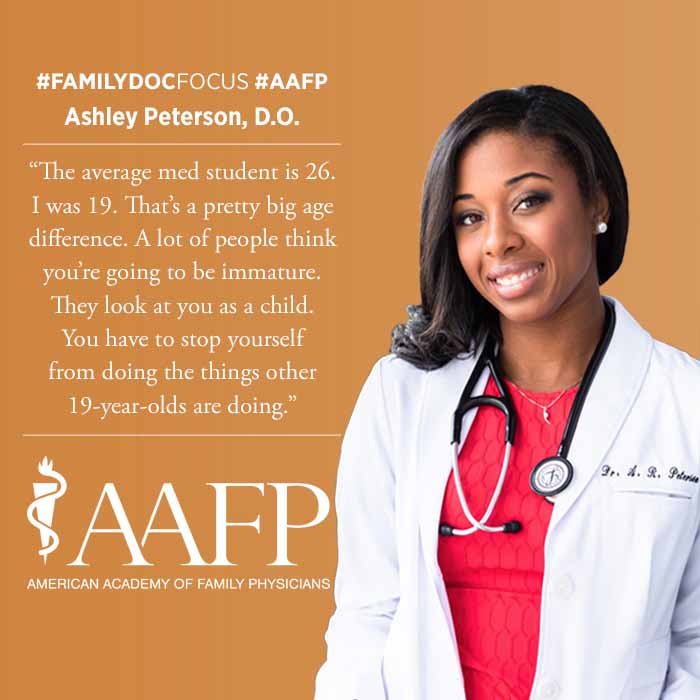Early Career Start Gives FP More Time to Make a Difference
March 02, 2020 01:58 pm David Mitchell -- First-time patients often are surprised when they meet Ashley Peterson, D.O.

"I have a lot of patients who say, 'You're the doctor? You look 16,'" said Peterson, who started her family medicine residency at Atlanta's Morehouse School of Medicine last July at age 24. "That's OK. I've made peace with it. I am young and I don't look like a stereotypical doctor."
Peterson, who started kindergarten at age 4, has been ahead of her peers for some time.
"In the fourth grade, I started getting in trouble because I would finish my work early and start talking to my friends," she said, "so the teacher gave me more work. I would still finish early, so then she started to really challenge me."
After a few months, Peterson made the leap to fifth grade. But bigger jumps were ahead. In high school, Peterson took summer classes at her magnet school in Atlanta. In November of her sophomore year, she realized she was just a few credits shy of meeting graduation requirements, so she enrolled in extra classes at the local community college and graduated early.
At 15, Peterson enrolled in the University of North Carolina-Charlotte.
"The question was, did I want to be a doctor or a pharmacist?" she said. "I shadowed a local pediatrician, and I leaned toward doctor because of the patient aspect."
After graduating with honors from UNC-Charlotte, Peterson started medical school at the Philadelphia College of Osteopathic Medicine in Suwanee, Ga. Peterson said her parents never pushed her academically, but she put pressure on herself to succeed.
"The average med student is 26," she said. "I was 19. That's a pretty big age difference. A lot of people think you're going to be immature. They look at you as a child. You have to stop yourself from doing the things other 19-year-olds are doing."
Peterson instead took on leadership roles. She served on committees for the Student National Medical Association, and later served as a chapter president and regional chair. She continues to be active in that organization as a resident mentor. She also is co-chair of her residency program's community service initiative.
Peterson ultimately hopes to practice outpatient medicine in an underserved community, likely in the South. And although family medicine residents already face a challenging path, Peterson -- as she did in fourth grade -- is taking on extra work. Last summer -- the same summer in which she graduated from medical school and started residency -- she launched an e-commerce business focused on women's clothing.
How can a busy resident -- who also has her own podcast and more than 7,000 followers on Instagram -- find time to run a business on the side?
"I have a team that helps supplement my time," she said. "Last month I was in a surgery rotation, and it was a bad month for the business. People were trying to find me, and I was working until midnight. This month has been better. I'm in a pediatrics rotation working 8 to 5, which allows me to have better creative and directional control of the business. It's about time management."
The fashion business isn't helping pay for her education. Any profits, she said, go back into the company.
Peterson has bigger business plans for the future. Ultimately, she hopes to combine her interests in fitness, nutrition and technology in a business model that focuses on preventive medicine.
"I have so many patients who don't know what a carb is," she said. "How can I as a doctor counsel people on insulin and diet if you don't know that? I believe it is not a patient's fault when they do not know details about certain aspects of their health. It falls on physicians and other health professionals to help educate people. By working together with patients to help better understand each other's perspectives, we can lead them to better health outcomes."